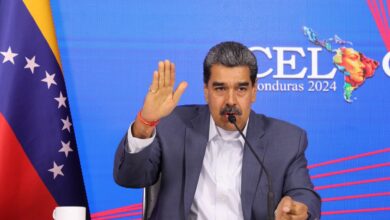Mexico withdraws diplomats from its embassy in Ecuador after raid

Mexico has withdrawn personnel from its embassy in Ecuador following the unprecedented storming of the building by security forces, Mexico’s Foreign Minister Alicia Barcena said.
The two countries severed ties after the raid made on Friday in a bid to arrest former Ecuadoran Vice President Jorge Glas, who was sheltering at the embassy.
Mexican President Andres Manuel Lopez Obrador called the arrest an “authoritarian” act and a violation of international law and Mexican sovereignty. He also instructed Barcena to suspend diplomatic ties with Ecuador.
Shortly afterwards, on Saturday, the Mexican foreign minister announced the “immediate” suspension of diplomatic ties with Ecuador.
“Our diplomatic staff are leaving everything in Ecuador and returning home with their heads held high … after the assault on our embassy,” Barcena added on Sunday.
The diplomats and their families went to Quito airport accompanied by the ambassadors of Germany, Panama, Cuba and Honduras, as well as the president of the Ecuador-Mexico Chamber, and are scheduled to travel on a commercial airline to Mexico City, the country’s foreign ministry added in a separate statement.
Agradecida por el acompañamiento de embajador@s de 🇩🇪,🇵🇦,🇨🇺,🇭🇳 y el pres. de la Cámara Ecuador-México.
Nuestro personal diplomático deja todo en 🇪🇨 y regresa a casa con la frente y el nombre de🇲🇽en alto tras asalto a nuestra Embajada.
Gracias amigos y aliados x su solidaridad. pic.twitter.com/893UgDuXzt— Alicia Bárcena (@aliciabarcena) April 7, 2024
Glas, a 54-year-old left-wing politician twice convicted of corruption, had been holed up in the Mexican embassy in Quito since seeking political asylum in December after an arrest warrant was issued against him. Mexico granted Glas asylum earlier on Friday, before the raid.
Equipped with a battering ram, Ecuadoran special forces surrounded the Mexican embassy, and at least one agent scaled the walls, in an almost unheard-of raid on diplomatic premises that are considered inviolable sovereign territory.
In a statement, Ecuador’s presidency accused Mexico of “having abused the immunities and privileges granted to the diplomatic mission that housed the former vice president, and granting diplomatic asylum contrary to the conventional legal framework”.
Mexico’s Lopez Obrador has said that he will file a complaint against Ecuador at the International Court of Justice.
His country also denounced “physical violence” against head of mission Roberto Canseco, who was pushed to the ground by officers while trying to prevent the invasion.
“How is it possible, it can’t be. This is crazy!” a shaken Canseco told local television after the raid.
On Saturday, the Mexican embassy remained surrounded by police and the country’s flag was taken down.
International condemnation
Sonia Vera, the international lawyer for Glas, told Reuters by telephone that his team was requesting help from the Inter-American Commission on Human Rights and the Inter-American Court of Human Rights, as well as assistance from the United Nations Security Council and General Assembly.
UN Secretary-General Antonio Guterres was “alarmed” by the raid, while Spain and the European Union both issued stinging statements condemning it as a violation of the Vienna Convention.
The 1961 convention, a treaty governing international relations, states that a country cannot intrude upon an embassy on its territory.
“Protecting the integrity of diplomatic missions and their personnel is essential to preserve stability and international order, promoting cooperation and trust between nations,” the EU said.
Governments across Latin America have also rallied around Mexico after the incident.
Argentina, Bolivia, Brazil, Chile, Colombia, Cuba, Peru, Uruguay and Venezuela sharply rebuked Ecuador on Saturday within hours of Glas’s seizure, with Nicaragua joining Mexico in severing diplomatic ties with Quito.
The United States also said it condemns any violation of the Vienna Convention protecting diplomatic missions and encouraged “the two countries to resolve their differences in accord with international norms”.
Daniel Noboa became Ecuador’s president last year, and in January, he declared the country to be in an “internal armed conflict” against drug-trafficking gangs.
Will Freeman, a fellow for Latin American studies at the Council on Foreign Relations, told the Associated Press that the decision to send police to Mexico’s embassy raises concerns over the steps Noboa is willing to take to get re-elected.
His tenure ends in 2025, as he was only elected to finish the term of former President Guillermo Lasso.
“I really hope Noboa is not turning more in a Bukele direction,” Freeman said, referring to El Salvador President Nayib Bukele, whose tough-on-crime policies have been heavily criticised by human rights organisations. “That’s to say, less respectful of rule of law in order to get a boost to his popularity ahead of the elections.”
Meanwhile, Vera, Glas’s lawyer, said she fears “something could happen” to him while in custody considering the track record of the country’s detention facilities, where hundreds of people have died during violent riots over the past few years. Those killed while in custody include some suspects in last year’s assassination of a presidential candidate.
“In Ecuador, going to jail is practically a death sentence,” Vera said. “We consider that the international political and legal person responsible for the life of Jorge Glas is President Daniel Noboa Azin.”
Read the full article here








